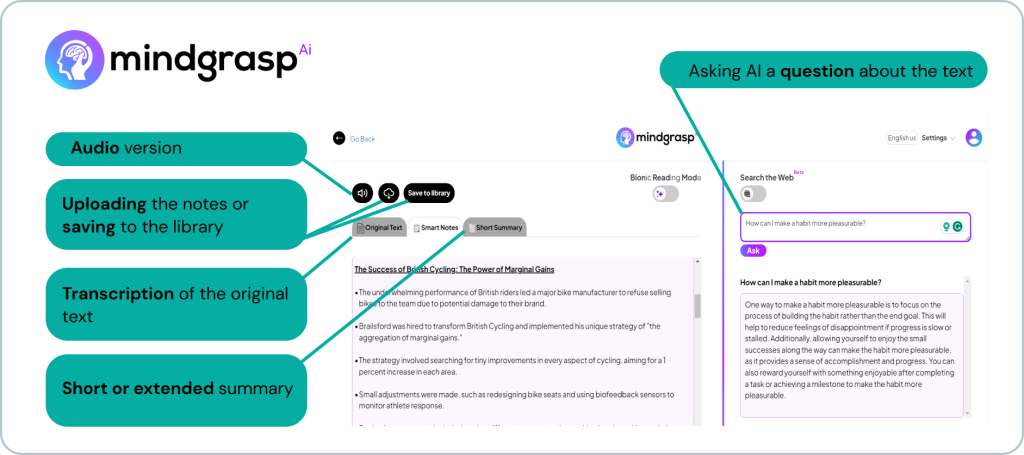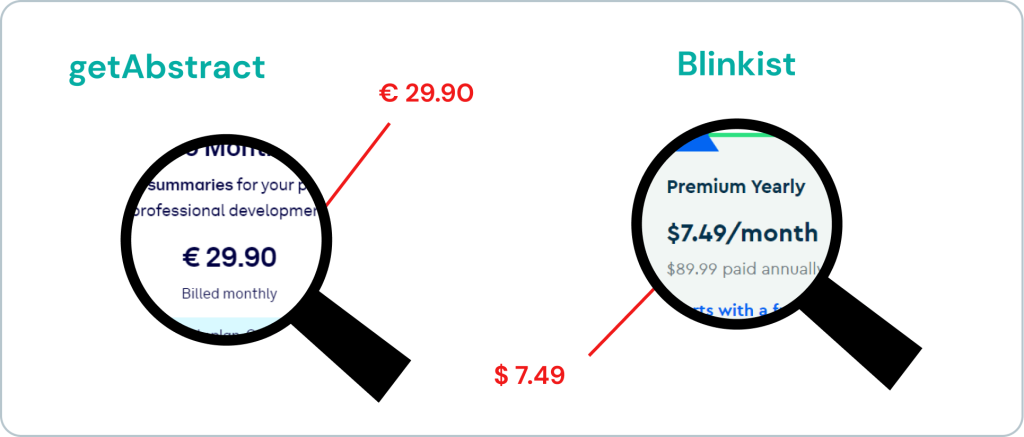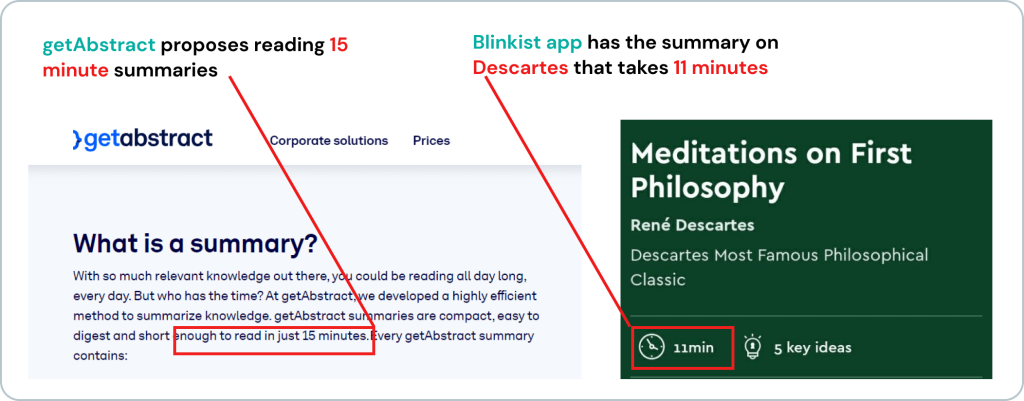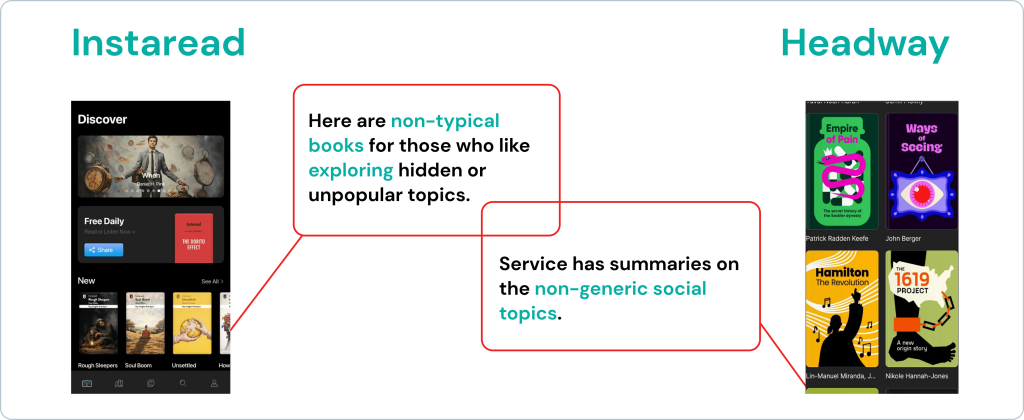Academic excellence is not a matter of the number of books you have read but the number of books you’ve understood and implemented. Some books, especially the self-help genre, have valuable points nowadays. However, these points usually fit in a few paragraphs, while the other two or three hundred pages just interpret them. For this reason, book summaries are handy tools.
There is a large variety of tools for book briefs. However, not all top-recommended book summary services are as good as advertised. Read this article to see the actual tests of the tool’s features and commentaries on the usability of each service for students. But before that, let’s agree on the criteria for choosing the best book summary apps or summary sites.
Further in the article: |
Why Students Desperately Need Book Summaries
Let’s start with a bold statement: book summary apps, in their majority, are not meant for education but for entertainment purposes. In this article, you will find commentaries on why summary apps like Blinkist or Instaread are fine for general self-development but unsuitable for studying. On the contrary, summary websites tend to propose more comprehensive and profound information and thus are a good choice for students.
The research found that 72% of students reported rarely or never completing reading assignments on schedule.
The primary reasons to read book summaries are:
- Having a lot of work on your plate already. Sometimes, it is physically impossible to cover all the reading while performing other activities. Therefore, it is better to get the major points of the reading than nothing.
- Checking multiple sources for a research proposal quickly. You don’t have to know everything about the topic when you write a proposal paper. You are testing the waters, so book summaries are good resources to get an idea of what’s happening.
- To pass the time. Using public transport or waiting in line are boring experiences. Listening to the audiobook summary is a useful way to spend time and boost your knowledge.
- For self-education or entertainment. You can use book summaries to understand the plot fast or get acquainted with the characters. As for the entertainment, you can decide whether you like the book without investing much into it. In general, it is like getting some food for thought without reading the whole piece.
If you fall into any of these categories, using book summaries for studies will make your free time more pleasurable and productive. In this article, you will find the answers to the following questions:
- How can I effectively use book summaries for writing essays?
- What are the best book summary websites for studies and work?
- What are the best book summary apps for general self-education and entertainment?
How to Use Book Summaries for Essay Writing
There are no good or bad instruments for writing essays. Students can and must use any available resources as long as it is not cheating or plagiarism. The only issue with book summaries is that some are less helpful with particular tasks. You can spend time searching through book summaries and find nothing relatable to your content.
Here are some ways particular book summary apps and websites can help you with different steps of writing an essay.
To collect your research sources fast
Some types of essays, such as analytical ones, require students to do extensive work finding, evaluating, and collecting sources. Even quickly reading 20+ papers takes time, which is a non-renewable resource. Book summary sites can propose fast and efficient book summaries so that you can understand whether the particular work fits your research.
“There is no problem with students using book summaries. There is a problem that sometimes students read poor-quality summaries and believe they are prepared to discuss the book. You can sometimes use book summaries in the classroom, but make sure to get a nice, extended, and comprehensive one.”
Nicholas Evans, a teacher of the English language
To find arguments for your thesis statement
Imagine you are writing an essay on leadership. You have read what seems like a kilometer-long list of books on this topic, and all of them are recent, interesting, and insightful works. However, when it comes to citing something, your mind is blank. All the knowledge is at your fingertips. Yet, you can’t recall where you saw a particular idea. Book summary applications collect the best excerpts from the book so you can use them to back up your statement.
As a rule, citations from book summary apps reflect the main author’s ideas, so you can be sure you get the best snippets but one hundred times faster. For instance, here is a small excerpt from the book “Lead from the Outside” by Stacey Abrams, using the Headway application: “Circumstances could steal your house, your job, or your car, but no one could take the contents of our minds.” You can use this citation as a hook sentence in your introduction paragraph or as an argument in your body paragraph. In both ways, the phrase is eye-catching and trustworthy, and it takes only two minutes to get it from the text.
To get another perspective on your topic
Using book summary services is especially relevant for personal and opinion essays. As a rule, these types do not require any resources and citations. The students should present their point of view on the topic, argue some positive and negative sides, or develop new ideas concerning the question. However, the essay should still be thoughtful and demonstrate careful consideration of the material covered in the course.
Book summaries are good tools for such cases as they retell the essential parts of someone’s thoughts. Imagine you have the option of a “lifeline,” and you can ask any person, living or dead, who has researched the topic before you. This way, you can grasp insights from multiple sources without investing a few days of your time just reading one of them.
“When you prepare background information for the essay, use book summaries to get a ‘helicopter view’ of your topic. You can always go for details in the original text, but too much data will get you overwhelmed. Book summary apps are handy for keeping you focused.”
Patric Johnson, a 4th year engineering student
The Best Book Summary Websites for Students
The best book summary websites nowadays are driven by AI or specialize in gathering large amounts of information. The first option is handy as AI can analyze any file or the available information across free-access databases. The second is helpful as they are the “libraries and archives” of data specified for information about a particular book. The top two summary sites for students are MindGrasp and Wikisummaries.
MindGrasp
MindGrasp is an AI-driven technology that analyzes any PDF you upload, presenting you with a brief or extended summary. You can also paste any link to the webpage to get the same result. With MindGrasp, you can enjoy:
- Book summaries for separate chapters. As a student, you can get a quick summary of any chapter from your coursebook. Use the basic Windows or Mac OS “Print to PDF” option to choose particular pages and then upload them to MindGrasp.
- Book summary site for free. This book summary site is free: no limited trial version and no payment for prolonged use.
- An alternative to the “Infinite library.” Many websites upload books for free for educational purposes. Such catalogs often include even recently written titles. For instance, with the simple “atomic habits pdf” Google prompt, you get the full text from opportunitiesforyouth.org. Therefore, your summary collecting possibilities with MindGrasp are not restricted in any possible way.
“Honestly, studying nursing and raising a son is a complicated task. MindGrasp helps me to review my knowledge across different disciplines quickly, so I have more time for my home routine.”
Cristel Roberts, a nursing student
- The options of listening to the summary. MindGrasp is not yet available in the application format, so listening from the phone on the go can be a little uncomfortable. However, the website still supports the audio format in the phone’s browser.
- More variability in operating the notes. While using the apps discussed above, you can make notes and upload them to any external resource. All applications also propose building a library of your personal books. However, with MindGrasp, you can also create a collection of summaries. That option is handy when you work with a file for a long time and return to it after a prolonged break.
Wikisummaries
It is commonly known that Wikipedia is not the most credible source due to its outsourcing nature: anyone on the web can sign in and add blocks of information to it. However, this rule is applicable when searching for precise data and an unambiguous perspective on a disputable topic. As Wikipedia is one of the largest digital libraries, it is still a good source for searching for information on popular books.
For instance, it is not likely that Wikisummaries will hold some irrelevant or false information on “Romeo and Juliet.” Such commonly known books held no personal interest for people to misinterpret but have collected available information around them. Wikisummaries is a good place to get this information in one piece and a coherent form.
Moreover, Wikipedia is almost the only resource to collect data on rare and unpopular titles. For instance, there is a beautifully written and fascinating book about the nature of the universe. “The Fabric of the Cosmos” by Brian Greene is nowhere to be found in any of the mentioned applications. Yet, Wiki sources propose information about its creation, the chapter-by-chapter summary, and the correlating links to the complicated terms from the book.
“I recommend using book summaries similarly to using ChatGPT. Do not let the tool do your work for you, but use the tool to engage in the task actively. For example, I use summaries only to understand whether I like the topic and then search for the whole book.”
Wang Shu Huang, a recent graduate in Pennsylvania
The Best Book Summary Applications for Self-Development
In the broad market of applications, there are four top book summary services:
- Blinkist
- getAbstract
- Instaread
- Headway
Blinkist and getAbstract are on the top because of their solid reading volumes. Blinkist has over 3000+ titles, and getAbstract has over 20,000 summaries; both resources have reading and listening formats. Instaread proposes summaries of articles along with briefs on books. One more quality service is Headway, which beats all other competitors in the depth of the material.
For the analysis of these apps, we have compared groups of two based on their similarities. The best book summary app preference is all yours, but we have provided some points for your well-weighted decision.
Blinkist vs. getAbstract
The price for the monthly subscription for Blinkist and getAbstract has a three-time difference. One month of using Blinkist premium costs $7.49, and one month of getAbstract subscription costs $32.83 (€ 29.90). The reason for this gap concerns the number of available summaries.
These two resources are suitable for comparison as they are close competitors in price, quality, and the number of available titles.
The major benefits of Blinkist are:
- The note-taking functionality: it is easy to take, copy, and share your favorite quotes from the summary
- The option of listening to each chapter separately, which is nice for having a mindful listening experience
- The possibility to suggest titles that are not in the store yet, thus getting summaries of your favorite books
Both applications work in the background and can switch to offline mode.. However, getAbstract still prevails in the number of bonuses and pleasurable options. For example, with this service, you can:
- Have a larger variety of filters for searching specific categories of books
- Subscribe to particular topic-driven channels and see updates not only on specific books but the whole research area
- Go for a free trial without attaching your credit card
- Have a better quality summary. getAbstract is not as good as book summary websites. However, the summaries here have more specific info than Blinkist’s counterparts
The main weakness Blinkist and getAbstract have in common is that many summaries propose overly generic information. It is not a consistent rule for all summaries, and you can still use the brief retelling to decide whether you like the book. However, this is a point for improvement for these applications.
The specific disadvantage of Blinkist is that you must attach your credit card to get a free trial. Compared to the simplified sign-up system in getAbstract, with Blinkist, you risk forgetting or missing the notification about the end of the free trial. However, in getAbstract, not every summary is available in audio format, and the service does not propose one daily summary for free, as Blinkist does.
If you have never tried reading or listening to book summaries, try Blinkist first to decide whether you like this format. If summaries suit you, switch to getAbstract for more serious reading.
Instaread Vs. Headway
Regarding price, Headway is a much more expensive app. The monthly cost of Instaread is $8.99 a month, while Headway charges $19.99 a month. However, Headway has a free plan with basic functionality. Both apps propose a 7-day free trial period to explore all services.
These two applications are a logical match as they stand somewhere between a book summary service and an app for practicing memory and learning. The reason is that both services have an option of creating flash cards. “Flashcards method” is a memory technique that teaches active recalling and time-spaced learning. This feature is a significant advantage of these apps, as you get two services in one place.
Another essential benefit of these two apps is the choice of literature. Contrary to Blinkist, with the hot updates of non-fic and self-help genres, both Instaread and Headway propose more atypical titles.
However, a significant flaw of Instaread is that some summaries have commentary on the author’s style instead of retelling the book’s content. Headway falls into the category of services that require attaching your credit card in advance to get a free trial, which is a drawback.
“My personal recommendation is Headway. I know the app is more pricey than some of its competitors, but I did not meet the same depth of the summary among other apps. Headway is the closest analog to book summary sites among applications.”
Akari Saito, a marketing student in New York
Q&A: What Book Summary Service to Choose If… Answers from Our Experts
Q: I need a book summary for my research paper. I do not have time to read all ten books that are relevant to my research; I just want to know which one is better for my topic. Which service should I choose?
Patric Johnson: Use Mindgrasp or Wikisummaries. These are the best summary services for research.
Q: I don’t want to waste time while getting to work in the morning. I want to get really good insights out of books quickly. Is there something for me?
Nicholas Evans: Yes, use Headway. This app has profound, well-composed summaries.
Q: I want to try the book summary format, but I don’t know whether I will like it. Can I try something inexpensive?
Patric Johnson: Yes, try Blinkist. Also, go for a free trial of Instaread and getAbstract.
Q: I like listening to books, not reading them. Which of the apps is better for me?
Nicholas Evans: Blinkist provides audio support for all book summaries.








